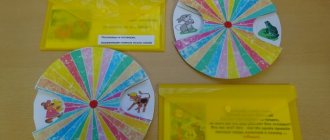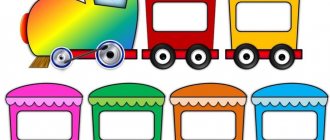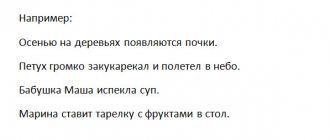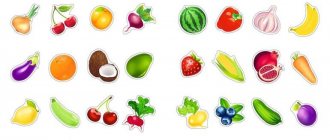Maria Malakhova
Didactic game
"
Vegetable garden "
.
For children of primary preschool age. Goal: - learn to determine the spatial arrangement of objects; clarify children’s knowledge about vegetables, where they grow, and their benefits to humans;
Learn to distinguish vegetables by appearance, describe them by their characteristic features;
Learn to use the general concept “Vegetables”
, enrich vocabulary by denoting qualities;
Develop attention, memory, perseverance, coordination of movements, fine motor skills of the hands.
Progress of the game: Children are given fruits and vegetables. They must distribute where the fruits grow and where the vegetables grow. While completing the task, children consolidate the names of vegetables.
Progress of the game: A garden is drawn on one album sheet, a vegetable garden on the other.
Nearby lie vegetables and fruits cut out of paper and colored with colored pencil.
Children distribute vegetables and fruits where they grow.
Publications on the topic:
Preschool children love to play with small toys. Therefore, they like to “plant” knitted vegetables in beds and knitted fruits.
DIY didactic game. To create this game, I made a layout on which I depicted a forest on one side and a forest on the other.
The game is made from an ordinary box covered with thick green fabric. A house is made from planks and glue. Decorative elements are used.
Games with food have always been interesting to children as such. Role-playing games in the “shop”, “vegetable garden”, “kitchen” are simply irreplaceable for girls.
DIDACTIC GAME “GIFTS FROM BURENKA!” Printed board game for children 4-5 years old TYPE OF GAME Cognitive orientation.
When working with children to develop fine motor skills, teach dialogical speech, and sensory education, you can use the following substitute items.
Summary of GCD for speech development. Didactic game for pronunciation of sounds [M]-[M'], [B]-[B']. Didactic game “Who left?” Goal: development of the articulatory apparatus. Objectives: 1. To develop the ability to clearly pronounce the sounds mm, b-b in sound combinations, to distinguish.
Dear Colleagues! In the nature center I placed a game for children of the second junior group “Vegetable Garden”, in the form of a model of a vegetable garden. The beds are made of centipon.
Abstract of the educational activity "Journey to the spring garden" of the workshop "Garden and Vegetable Garden" with children of the first junior group.
On the topic: methodological developments, presentations and notes
The main functions of a didactic game. A didactic game is a multifaceted, complex pedagogical phenomenon: it is both a game method of teaching preschool children and advanced.
The purpose and objectives of the musical game, Important aspects, Groups, forms of games.
An article for parents on musical education of preschool children.
Goal: to consolidate children’s knowledge about vegetables, clarify their name, color, shape, teach them to distinguish by appearance; expand the understanding of growing vegetable crops; develop observation and lu.
Expand your understanding of growing vegetables.
Expand your understanding of growing vegetables.
Source
Didactic game “Plant a vegetable garden”
Tatyana Gennadievna Tikhonova
Didactic game “Plant a vegetable garden”
Didactic games help children consolidate the knowledge gained in classes, excursions, while watching cartoons and videos, etc. I bring to your attention the didactic game “ Plant a Vegetable Garden ”. I made this game with my own hands. In our kindergarten there was a competition of didactic games based on Wenger . All groups took an active part.
The game consists of two types of cards. The cards are divided into four parts.
Some cards have yellow and green circles glued on them.
I cut out silhouettes of cucumbers and turnips from cardboard, painted them and varnished them.
At first, it is difficult for children to lay out the image correctly, but with experience comes skill.
I think many people have such a game , but I made this game with my own hands.
We have a vegetable garden that doesn’t grow in the window.
play it , we develop our minds.
Campaign “Plant a Tree” Campaign “Plant a Tree” Prepared by teacher Karasteleva Svetlana Anatolyevna In the kindergarten “Yagodka”, in October 2016, it took place.
Author's didactic game on environmental education "Plant a forest" for children of the middle group Author's didactic game on environmental education "Plant a forest" for children of the middle group The game is designed for middle-aged children.
Didactic game “What is harmful, what is useful” and didactic game “Dangerous and safe objects” Didactic game “What is harmful, what is useful” Purpose. To consolidate children's knowledge about harmful and beneficial phenomena and objects. Develop the ability to explain. Didactic game for children of senior preschool age. Printed board game “Make a story from a picture” Printed board game “Make a story from a picture” (This game can be used as additional material for development classes. Do-it-yourself didactic game for kindergarten “Garden and Vegetable Garden”. Master class Didactic The game "Garden and vegetable garden?" is intended for young children to consolidate knowledge about fruits and vegetables. Purpose: consolidation. Didactic game "Vegetable Garden" Games with food have always been interesting to children as such. Thematic role-playing games in "shop", "vegetable garden" ", "kitchen" are simply irreplaceable for girls. Didactic game for FEMP "Merry Garden" Didactic game for FEMP "Merry Garden" Age: middle group Goal: to develop children's ability to count objects, consolidate numbers within limits. Didactic game "Sound - letters" (author's game) Didactic game "Sound - letters" Purpose: To teach children to conduct a sound analysis of words, to isolate word stress. To consolidate the ability to identify.
Source
Progress of the game.
The teacher clarifies that children will call the edible root of a vegetable roots, and the edible fruit on the stem - tops. Explains; that you can only answer in two words: tops and roots. Whoever makes a mistake will pay a forfeit, which is redeemed at the end of the game . The teacher names a vegetable, and the children quickly answer what is edible in it - the tops or roots. The teacher warns that children must be attentive, since some vegetables contain both edibles. Children with ODD and mental retardation need object pictures for support.
Didactic game "Autumn Fair"
Progress of the game.
The teacher names a vegetable or fruit and asks them to remember the dish that can be prepared from it. The one to whom the ball is thrown must name the dish without repeating itself. A child who makes a mistake or does not say anything misses the game. The teacher can set a dish, and the children must remember its components and agree on what component each of them will be. The host shouts out what he wants to put in the pan, and the one who recognizes himself jumps into the circle. The next one jumps up and takes the hand of the previous one. Until all the components are in the circle, the game continues. You can use mask caps, medallions with images of vegetables and fruits.
Didactic game “What is eaten raw and what is cooked?”
Progress of the game
The teacher asks: “Children, do you know what they plant in the garden ? Let’s play this game: I will name different objects, and you listen carefully. If I name something that is planted in the garden , you answer “yes”
, if what
doesn’t grow in the garden , you will say “no”
.
Whoever makes a mistake loses " Educator. Carrot. Children. Yes! Educator. Cucumbers. Children. Yes! Educator. Beet. Children. Yes! Educator. Plums. Children. No! If someone is in a hurry and answers incorrectly, the teacher can say: “If you rush, you will make people laugh.
Be careful!" Didactic game "Gardener"
.
Objectives: – development of general speech skills, coordination of speech and movement, development of fine motor skills, development of the grammatical structure of speech.
Yesterday we walked in the garden, (Children walk in a circle, holding hands.)
We planted currants.
(They depict how they dig a hole and plant a bush in it.)
We whitened the apple trees with lime and whitewash.
(Move your right hand up and down.)
We repaired the fence,
(Imitate blows with a hammer.)
We started a conversation: - Tell me, our Gardener, what will you give us as a reward? (Worth
What will I give you as a reward! (For each name of fruit, bend one finger on the right hand.)
Didactic game “Harvest”
Didactic game "Vegetable garden"
Yana Romanchenko
Didactic game "Vegetable garden"
Games with food have always been interesting to children as such. Role-playing games in the “shop”, “ vegetable garden” , “kitchen” are simply irreplaceable for both girls and boys.
Integration of educational areas: “Cognition”
,
"Communication"
,
"Health"
.
The manual consists of six knitted dummies of vegetables (carrots, beets, cabbage)
Goal: to expand and clarify children's knowledge about vegetables.
Task:1) Consolidate knowledge about vegetables. 2) To develop the ability to distinguish vegetables by shape and color. 3) To develop children’s interest in the plant world, to develop cognitive activity and communication skills during joint games.
It’s very interesting to play , firstly, pleasant materials that perfectly stimulate the child’s tactile sensations and secondly, during the game the child generalizes and refines his knowledge about vegetables, where they grow, and their benefits for humans.
The kids can be allowed to play at their own discretion , i.e., whatever they want, they “sit in.” You can also set tasks to develop spatial thinking, for example: “Plant the carrots in the upper right corner and the cabbage in the lower right.” Thanks to the game, you can develop interactive speech in children, for example: “What color are carrots? What about beets?
There are many analogues on the Internet, I ended up with this cheerful vegetable garden )
Didactic game “What is harmful, what is useful” and didactic game “Dangerous and safe objects” Didactic game “What is harmful, what is useful” Purpose. To consolidate children's knowledge about harmful and beneficial phenomena and objects. Develop the ability to explain. Didactic game for children of senior preschool age. Printed board game “Make a story from a picture” Printed board game “Make a story from a picture” (This game can be used as additional material for development classes. Do-it-yourself didactic game for kindergarten “Garden and Vegetable Garden”. Master class Didactic The game "Garden and vegetable garden?" is intended for young children to consolidate knowledge about fruits and vegetables. Purpose: consolidation. Didactic game for FEMP "Fun vegetable garden" Didactic game for FEMP "Fun vegetable garden" Age: middle group Goal: to develop children's ability to count objects, fix the numbers within. Didactic game “Fold the picture.” Educational game “Draw with rubber bands” Objectives: to help children develop visual perception, voluntary attention, memory and imaginative thinking, as well as consolidate the names of colors. Didactic game “Sound - letters” ( author's game) Didactic game "Sound - letters" Purpose: To teach children to conduct a sound analysis of words, isolate word stress. To consolidate the ability to identify.
Drama lesson summary Pantomime game “The hare had a garden” Technological map of organized educational activities No. 1 Educational area: Communication Section: Drama Topic: Pantomime game “There was.
"Vegetable garden on the window." Project “Merry Vegetable Garden” in the middle group Relevance of the project topic: the project is aimed at expanding and generalizing knowledge about cultivated garden plants of the Azov region, so...
Source
Didactic game for repetition of the Tatar language “Bar matur bakcha. Beautiful vegetable garden"
Anna Baretskaya
Didactic game for repetition of the Tatar language “Bar matur bakcha. Beautiful vegetable garden"
Municipal autonomous preschool educational institution
"Kindergarten No. 97 combined type"
Moskovsky district of Kazan
Author: teacher of MADOU No. 97
Baretskaya Anna Sergeevna
Goal: To systematize children’s knowledge on the topics “Minem eat” (“My home”, “Yashelchlr m imeshlr” (“Vegetables and fruits”)
.
Educational: to intensify the monologue and dialogic speech of children in two state languages - Russian and Tatar ;
Developmental: develop the ability to master and transform the surrounding space, children's interest in play and speech activities; development of fine motor skills.
Educational: to cultivate interest in learning the Tatar language , the desire to know it.
This manual can be used by the teacher to reinforce words on these topics, and children can also play independently . These games will not bore your child and will make learning interesting and educational.
Material: carpet, construction house, cards with a picture of a family; a set of fruits and vegetables cut out of hard felt. Using tape (Velcro, buttons, glued and sewn on the back side), fruits are attached to the tree, and vegetables to the bed; tree and bed, basket.
A game for children of middle and senior preschool age, depending on the variability of the game.
There can be from two to six people playing
Progress of the game: Children are invited to assemble a house from parts cut out of felt, and “plant” a garden and a vegetable garden.
Game option 1: “Yig Chakyr” (“Invite into the house”)
The teacher asks to answer the question: By whom?
(Who is this)
Children's answer: Bu ni - this is mom, etc. and invite them into the house, for example: ni kiel monda - mom, come here. Same with all family members. Whoever gives the most correct answers wins.
Option 2 of the game: “Uyshny y, sana” (“Collect and count the harvest”)
.Children answer the questions: “Bu nrs?”
("What's this?")
;
“Nindy?” ("Which)
;
“Nothing?” ("How many?")
.
The winner is the one who correctly answers the questions and counts vegetables and fruits in the Tatar language .
Game option 3: “Tslrne address it” (“Name the color correctly”)
.
Children name the color of objects in Tatar . Whoever names the most objects by color wins.
Summary of the lesson “Vegetable garden” Purpose: to consolidate children’s knowledge about the characteristic properties of vegetables and fruits (shape, color, taste, surface features); clarify who and where.
Do-it-yourself didactic game for kindergarten “Garden and Vegetable Garden.” Master class Didactic game “Garden and vegetable garden?” Designed for young children to consolidate knowledge about fruits and vegetables. Goal: consolidation. Didactic game for sensory development of children 2–3 years old “Zaikin’s garden”. Master class with step-by-step photos Description of the material: this master class shows the process of making a didactic game for the sensory development of children 2-3 years old. Didactic game “On the way to kindergarten” DIDACTIC GAME “ON THE WAY TO KINDERGARTEN” Revyakina Olga Konstantinovna Teacher of the speech therapy group Relevance: educate. Didactic game based on FEMP “Merry Garden” Didactic game based on FEMP “Merry Garden” Age: middle group Goal: to develop children’s ability to count objects, to consolidate numbers within limits. Didactic game "Merry vegetable garden" or sewn utilities Didactic game "Merry vegetable garden". This game can be used in working with children of primary preschool age in classes. Design of the site “Our garden and vegetable garden” Good afternoon, dear friends! The weather is wonderful outside, it’s summer, which means we’re planting, growing, and watering everything. This year my parents and I...
Organized educational activities for learning the Tatar language at special moments in the middle group. Summary of the special moment for teaching children the Tatar language according to the project of the educational complex “Minem Em” in the middle group. Consolidation of vocabulary.
Russian language lesson. Grade 5 “Repetition, generalization of material on the topic “Adjective. World of Art” Topic: Repetition, generalization of material on the topic “Adjective”. "World of Art". Goals and objectives of the lesson: 1. Repeat, consolidate what has been learned.
Source







